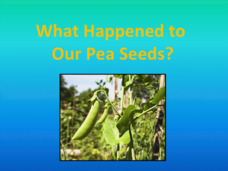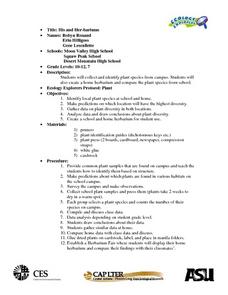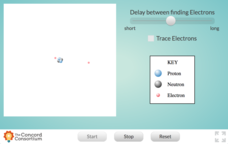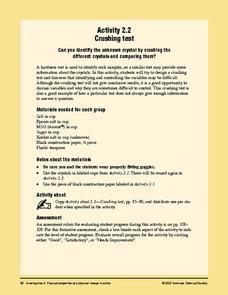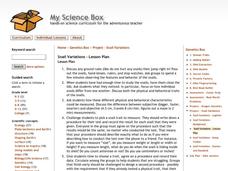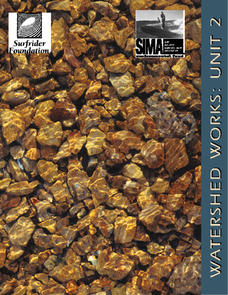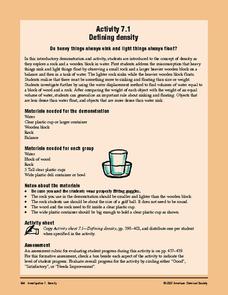Primary Resources
What Plants Need to Grow
What do seeds need in order to grow into plants? This presentation follows what happened every four days during a seed growth and observation study. Images compare how well two sets of seeds did under specific circumstances. Use this to...
Curated OER
Shadows & Light, Science & Puppetry
Lights, shadows, action, and inquiry await your artistic scientists. They explore the way light travels, absorbs, reflects, and transmits through shadow play. They create folktale-inspired shadow puppets, explore the science of light,...
Curated OER
Science: Her-bariums Galore!
Students collect and identify plant species and construct herbariums both at school and at home. By gathering data from both locales, they draw conclusions and make predictions about plant diversity. Upon completion of the exercises,...
CK-12 Foundation
Magnifying Glass
How can a magnifying glass or reading glasses make things appear larger? Scholars simulate moving a lens closer or farther from an object to observe the resulting image. They also alter the lens focal length. The simulation shows the...
Concord Consortium
Structure of an Atom
Feeling a little uncertain about your materials for teaching the quantum mechanical model of the atom? Here is an interactive that will help! Chemistry and physics scholars alike will benefit from a simple resource that illustrates the...
National Nanotechnology Infrastructure Network
Taking a Closer Look at Objects
Take a close look at the world around you with an activity that magnifies everyday objects. Five explorations examine items under intense magnification and pose a series of questions that encourage critical thinking and following...
Colorado State University
Why Does the Wind Blow?
Without wind, the weather man wouldn't have much to talk about! Blow away your junior meteorologists with a creative demonstration of how wind works. The activity uses an empty soda bottle and compressible Styrofoam peanuts to illustrate...
Cornell Lab of Ornithology
Life In A Nest: Exploring Life Cycles With Bird Cams
Why read about it when you can watch it happen? Bird cams make it possible for learners to experience the life cycle of a bird in real time! An engaging set of lessons provides activities to connect their learning to bird cam...
Clarkson University
Understanding Energy (With a Pendulum)
Have you ever wanted to play with a giant pendulum? An experiment allows small groups to do just that. They gather data and make observations as they complete the included worksheet. The lesson lays out each instruction including how...
Olomana School
Mixtures and Solutions: Paper Chromatography Experiment
Why does some ink bleed through paper, and other ink doesn't? Practice some paper chromatography to separate the colors from a pen with an interactive experiment for middle and high schoolers. Learners use a variety of solutions to track...
American Chemical Society
Crushing Test
Solidify understanding of the properties of crystals by crushing them to compare hardness. After some class discussion, a procedure is planned, and then small groups go about making observations as they crush five different crystal...
PBS
Observation
Students study making scientific observations . They conduct a "field study" in their attic and make observations about their family artifacts based upon physical attributes. In addition, they determine what characteristics of an object...
Curated OER
The Magic School Bus Gets Ants in Its Pants
Students learn along with Ms. Frizzle's class. In this Magic School Bus lesson plan, students observe ants doing some tasks by making them a temporary indoor home.
Curated OER
Milkweed and Monarch Butterfly Mania Observations
In this milkweed and monarch butterfly mania observations worksheet, students observe the photo, take notes and make a prediction about the habitat of the monarch butterfly. This page has serveral links to helpful web resources.
Curated OER
Observing Trees
Students create a timeline of a tree in a given time span. In this life cycle lesson, students observe one particular tree at the beginning of the year, and continue their observations for several weeks to create a timeline of the...
Curated OER
Applied Science - Physics Pre-Lab
Students describe the science of physics. In this Physics lesson plan, students observe examples of physics within their classroom. Students create a definition for physics.
Marcia's Science Teaching Ideas
Observing the Moon Activity
In this moon worksheet, students observe the moon on three consecutive nights and draw their observations. They answer questions about the phases of the moon and its position in the night sky. They identify the position of the sun, earth...
Curated OER
Applied Science - Science and Math Lab
Learners examine fabric. In this Applied Science lesson, students look at the fibers of fabric through a microscope. Learners compare and contrast a variety of fibers.
Curated OER
My Science Box: Snail Variation
Students observe snails and their characteristics. In this science lesson, students decide how to measure their snails and to observe a behavioral trait. Students create a graph to present their findings.
Curated OER
Common Themes
Tenth graders test usefulness of a model Earth by comparing its predictions to observations in the real world. In this landforms lesson students construct an island from a contour map using model clay then analyze the landscape...
Curated OER
Watershed Works: Unit 2
The second of a three-unit lesson plan, this focuses on how human-made structures affect watersheds. Using watershed models that were built during the first unit, junior geologists now place buildings, dams, or levees into the models and...
Curated OER
Tutti Frutti
Get some competition going in your life science class. Give lab groups a variety of plant parts, all of them fruits, except one. Their mission is to make observations, compare and contrast, in order to be the first to identify the...
American Chemical Society
Defining Density
Three simple activities kick off a unit investigation of density. Your physical scientists make observations on the volume and mass of wood, water, and rocks, and make comparisons. Though this is written for grades three through eight,...
Curated OER
Using Your Senses
Here is a terrific activity that uses a special State Quarter as a learning tool. This one uses the Alabama State Quarter. During this activity, pupils learn about their five senses. They make observations about what is in paper bags...
